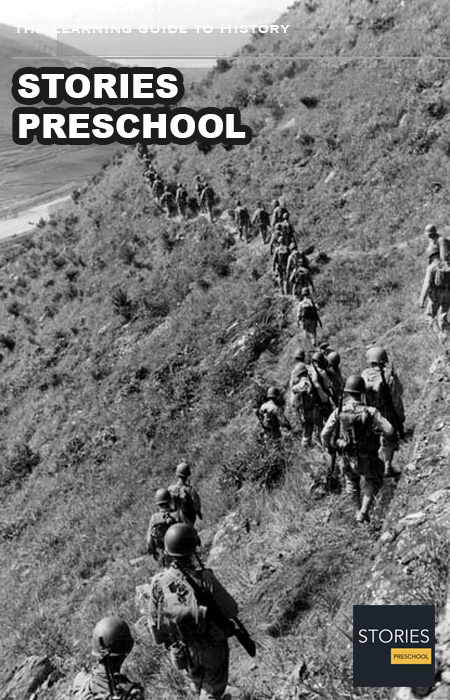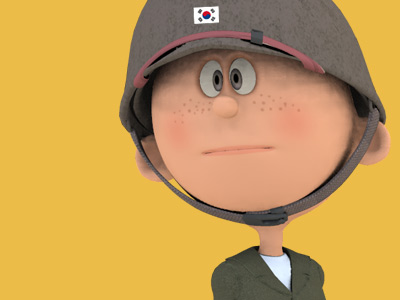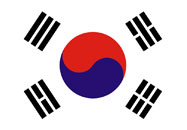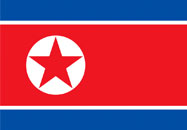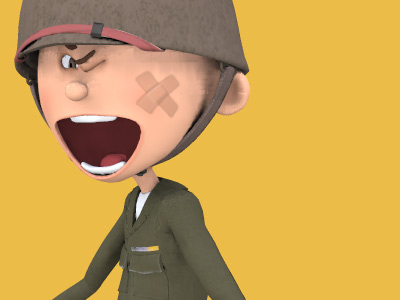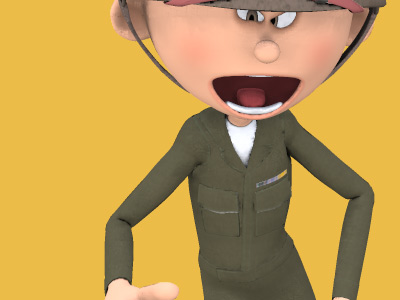Korean War 한국전쟁 (1950-1953)
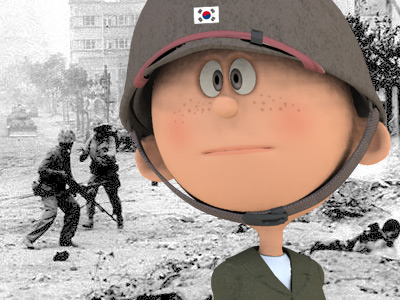
The Korean War (in South Korean Hangul: 한국전쟁; Hanja: 韓國戰爭; 25 June 1950 – 27 July 1953) began when North Korea invaded South Korea. The United Nations, with the United States as the principal force, came to the aid of South Korea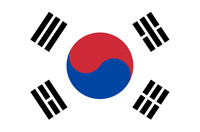 South Korea officially the Republic of Korea (ROK), is a country in East Asia, constituting the southern part of the Korean Peninsula and sharing a land border with North Korea. Since the 21st century, South Korea has been renowned for its globally influential pop culture, particularly in music (K-pop), TV dramas (K-dramas) and cinema, a phenomenon referred to as the Korean wave.. China came to the aid of North Korea, and the Soviet Union gave some assistance.
South Korea officially the Republic of Korea (ROK), is a country in East Asia, constituting the southern part of the Korean Peninsula and sharing a land border with North Korea. Since the 21st century, South Korea has been renowned for its globally influential pop culture, particularly in music (K-pop), TV dramas (K-dramas) and cinema, a phenomenon referred to as the Korean wave.. China came to the aid of North Korea, and the Soviet Union gave some assistance.
Korea was ruled by Japan from 1910 until the closing days of World War II. In August 1945, the Soviet Union declared war on Japan The Empire of Japan, also known as the Japanese Empire or Imperial Japan, was a historical nation-state and great power that existed from the Meiji Restoration in 1868 until the enactment of the post-World War II 1947 constitution and subsequent formation of modern Japan. Economic and political turmoil in the 1920s led to the rise of militarism, nationalism and totalitarianism eventually culminating in Japan's membership in the Axis alliance. , as a result of an agreement with the United States
The Empire of Japan, also known as the Japanese Empire or Imperial Japan, was a historical nation-state and great power that existed from the Meiji Restoration in 1868 until the enactment of the post-World War II 1947 constitution and subsequent formation of modern Japan. Economic and political turmoil in the 1920s led to the rise of militarism, nationalism and totalitarianism eventually culminating in Japan's membership in the Axis alliance. , as a result of an agreement with the United States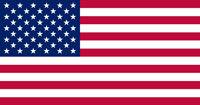 The United States of America (U.S.A. or USA), commonly known as the United States (U.S. or US) or America, is a country in North America. It is the world's third-largest country by both land and total area. The United States shares land borders with Canada to its north and with Mexico to its south. The national capital is Washington, D.C., and the most populous city and financial center is New York City., and liberated Korea north of the 38th parallel. U.S. forces subsequently moved into the south. By 1948, as a product of the Cold War between the Soviet Union
The United States of America (U.S.A. or USA), commonly known as the United States (U.S. or US) or America, is a country in North America. It is the world's third-largest country by both land and total area. The United States shares land borders with Canada to its north and with Mexico to its south. The national capital is Washington, D.C., and the most populous city and financial center is New York City., and liberated Korea north of the 38th parallel. U.S. forces subsequently moved into the south. By 1948, as a product of the Cold War between the Soviet Union Soviet Union, officially the Union of Soviet Socialist Republics (USSR), was a transcontinental country that spanned much of Eurasia from 1922 to 1991. The Soviet Union fall process began with growing unrest in the Union's various constituent national republics developing into an incessant political and legislative conflict between them and the central government. Estonia was the first Soviet republic to declare state sovereignty inside the Union. and the United States, Korea was split into two regions, with separate governments.
Soviet Union, officially the Union of Soviet Socialist Republics (USSR), was a transcontinental country that spanned much of Eurasia from 1922 to 1991. The Soviet Union fall process began with growing unrest in the Union's various constituent national republics developing into an incessant political and legislative conflict between them and the central government. Estonia was the first Soviet republic to declare state sovereignty inside the Union. and the United States, Korea was split into two regions, with separate governments.
Both governments claimed to be the legitimate government of all of Korea, and neither side accepted the border as permanent. The conflict escalated into open warfare when North Korean North Korea, officially the Democratic People's Republic of Korea (DPRK) is a country in East Asia, in the northern part of the Korean Peninsula. The capital and largest city is Pyongyang. The Korean Demilitarized Zone marks the boundary between North Korea and South Korea. The legitimacy of this border is not accepted by either side, as both states claim to be the legitimate government of the entire peninsula. forces—supported by the Soviet Union and China—moved into the south on 25 June 1950. On that day, the United Nations (UN)
North Korea, officially the Democratic People's Republic of Korea (DPRK) is a country in East Asia, in the northern part of the Korean Peninsula. The capital and largest city is Pyongyang. The Korean Demilitarized Zone marks the boundary between North Korea and South Korea. The legitimacy of this border is not accepted by either side, as both states claim to be the legitimate government of the entire peninsula. forces—supported by the Soviet Union and China—moved into the south on 25 June 1950. On that day, the United Nations (UN)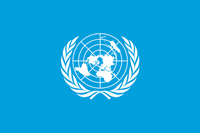 United Nations (UN) is an intergovernmental organization whose stated purposes are to maintain international peace and security, develop friendly relations among nations, achieve international cooperation, and be a centre for harmonizing the actions of nations. The UN was established after World War II with the aim of preventing future world wars, succeeding the League of Nations, which was characterized as ineffective. Security Council recognized this North Korean act as invasion and called for an immediate ceasefire. On 27 June, the Security Council adopted S/RES/83: Complaint of aggression upon the Republic of Korea and decided the formation and dispatch of the UN Forces in Korea. Twenty-one countries of the United Nations eventually contributed to the UN force, with the United States providing 88% of the UN's military personnel.
United Nations (UN) is an intergovernmental organization whose stated purposes are to maintain international peace and security, develop friendly relations among nations, achieve international cooperation, and be a centre for harmonizing the actions of nations. The UN was established after World War II with the aim of preventing future world wars, succeeding the League of Nations, which was characterized as ineffective. Security Council recognized this North Korean act as invasion and called for an immediate ceasefire. On 27 June, the Security Council adopted S/RES/83: Complaint of aggression upon the Republic of Korea and decided the formation and dispatch of the UN Forces in Korea. Twenty-one countries of the United Nations eventually contributed to the UN force, with the United States providing 88% of the UN's military personnel.
After the first two months of the conflict, South Korean forces were on the point of defeat, forced back to the Pusan Perimeter. In September 1950, an amphibious UN counter-offensive was launched at Inchon, and cut off many of the North Korean troops. Those that escaped envelopment and capture were rapidly forced back north all the way to the border with China at the Yalu River, or into the mountainous interior. At this point, in October 1950, Chinese forces crossed the Yalu and entered the war. Chinese intervention triggered a retreat of UN forces which continued until mid-1951.
After these reversals of fortune, which saw Seoul change hands four times, the last two years of conflict became a war of attrition, with the front line close to the 38th parallel. The war in the air, however, was never a stalemate. North Korea was subject to a massive bombing campaign. Jet fighters confronted each other in air-to-air combat for the first time in history, and Soviet pilots covertly flew in defense of their communist allies.
The fighting ended on 27 July 1953, when an armistice was signed. The agreement created the Korean Demilitarized Zone to separate North Korea and South Korea, and allowed the return of prisoners. However, no peace treaty has been signed, and the two Koreas are technically still at war. Periodic clashes, many of which are deadly, have continued to the present.
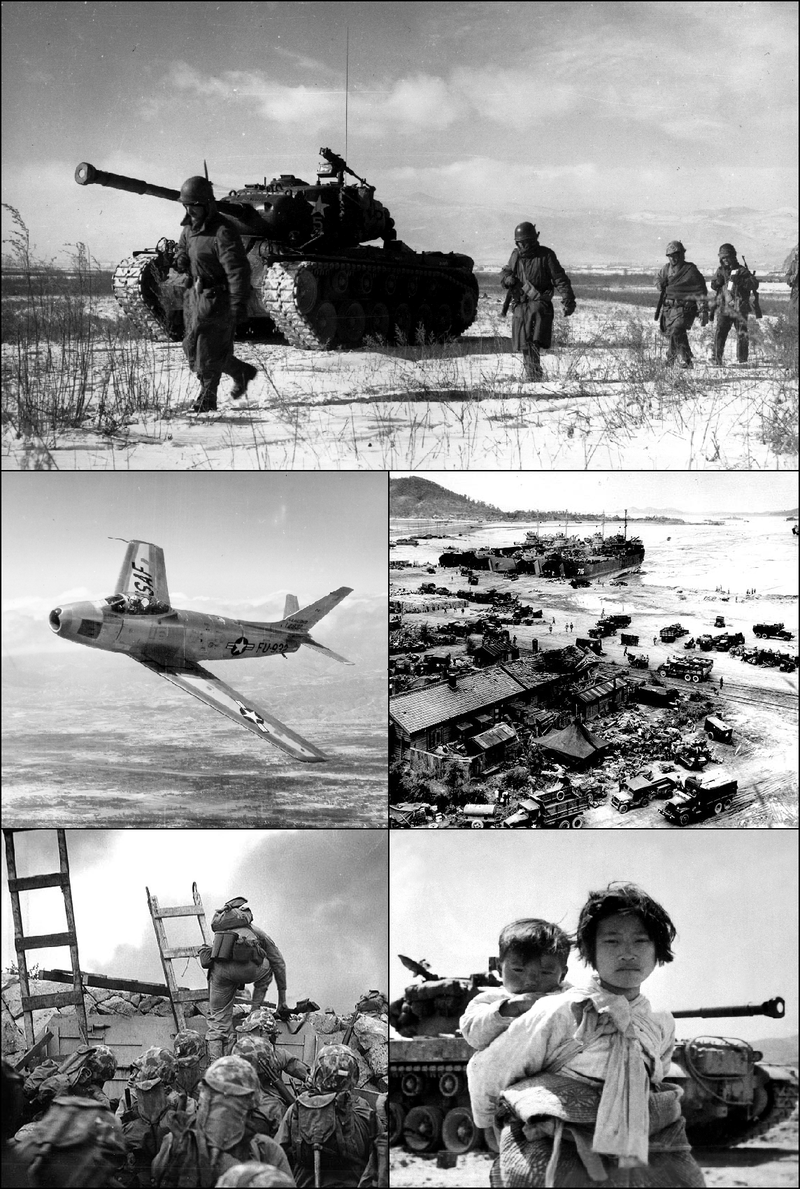
Montage of images from the Korean War. Clockwise from top: U.S. Marines retreating during the Battle of the Chosin Resevoir, U.N. landing at Incheon, Korean refugees in front of an American M-26 tank, U.S. Marines, led by First Lieutenant Baldomero Lopez, landing at Incheon, and an American F-86 Sabre fighter jet.
Names
In the U.S., the war was initially described by President Harry S. Truman as a "police action" as it was an undeclared military action, conducted under the auspices of the United Nations. It has been referred to in the Anglosphere as "The Forgotten War" or "The Unknown War" because of the lack of public attention it received both during and after the war, and in relation to the global scale of World War II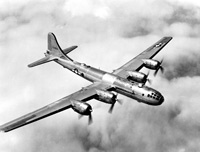 World War II or the Second World War, often abbreviated as WWII or WW2, was a world war that lasted from 1939 to 1945. It involved the vast majority of the world's countries—including all of the great powers—forming two opposing military alliances: the Allies and the Axis powers. World War II was a total war that directly involved more than 100 million personnel from more than 30 countries. World War II is generally considered to have begun on 1 September 1939, when Nazi Germany, under Adolf Hitler, invaded Poland. View World War II », which preceded it, and the subsequent angst of the Vietnam War, which succeeded it.
World War II or the Second World War, often abbreviated as WWII or WW2, was a world war that lasted from 1939 to 1945. It involved the vast majority of the world's countries—including all of the great powers—forming two opposing military alliances: the Allies and the Axis powers. World War II was a total war that directly involved more than 100 million personnel from more than 30 countries. World War II is generally considered to have begun on 1 September 1939, when Nazi Germany, under Adolf Hitler, invaded Poland. View World War II », which preceded it, and the subsequent angst of the Vietnam War, which succeeded it.
In South Korea, the war is usually referred to as "625" or the "6–2–5 Upheaval" (6.25 동란 (動亂), yook-i-o dongnan), reflecting the date of its commencement on 25 June.
In North Korea, the war is officially referred to as the "Fatherland Liberation War" (Choguk haebang chǒnjaeng) or alternatively the "Chosǒn [Korean] War" (조선전쟁, Chosǒn chǒnjaeng).
In China, the war is officially called the "War to Resist U.S. Aggression and Aid Korea" although the term "Chaoxian (Korean) War" is also used in unofficial contexts, along with the term "Korean Conflict" more commonly used in regions such as Hong Kong and Macau.
HISTORY
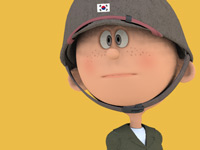
RESOURCES
This article uses material from the Wikipedia article "Korean War", which is released under the Creative Commons Attribution-Share-Alike License 3.0.
© Stories Preschool. All Rights Reserved.
